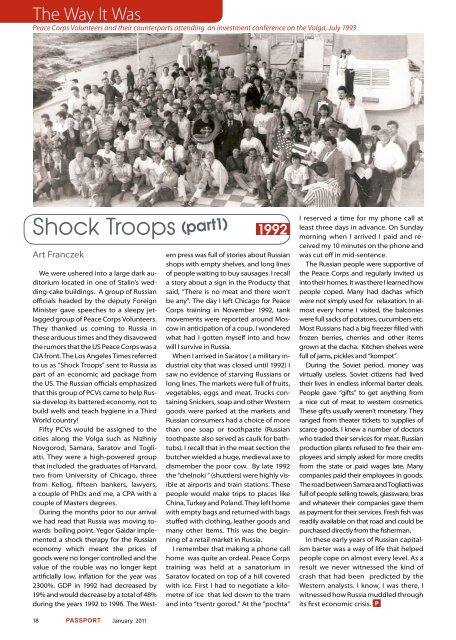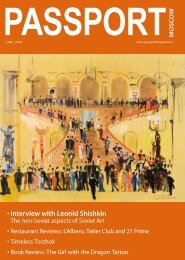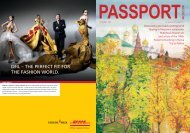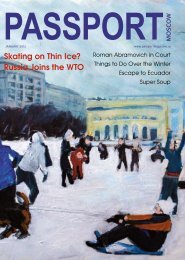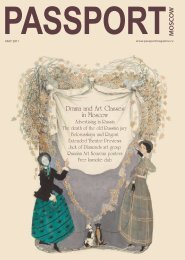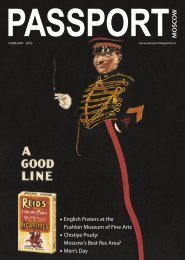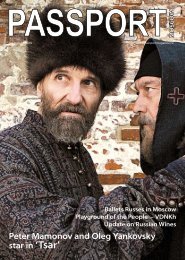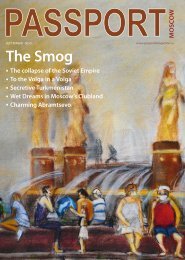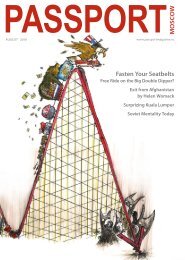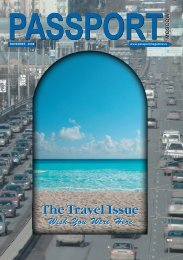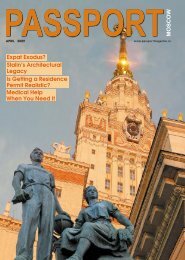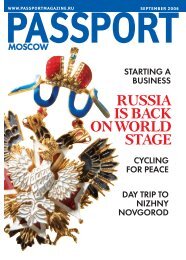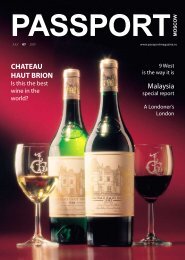Create successful ePaper yourself
Turn your PDF publications into a flip-book with our unique Google optimized e-Paper software.
The Way It Was<br />
Peace Corps Volunteers and their counterparts attending an investment conference on the Volga, July 1993<br />
Shock Troops 1992<br />
Art Franczek<br />
We were ushered into a large dark auditorium<br />
located in one of Stalin’s wedding-cake<br />
buildings. A group of Russian<br />
officials headed by the deputy Foreign<br />
Minister gave speeches to a sleepy jetlagged<br />
group of Peace Corps Volunteers.<br />
They thanked us coming to Russia in<br />
these arduous times and they disavowed<br />
the rumors that the US Peace Corps was a<br />
CIA front. The Los Angeles Times referred<br />
to us as “Shock Troops” sent to Russia as<br />
part of an economic aid package from<br />
the US. The Russian officials emphasized<br />
that this group of PCVs came to help Russia<br />
develop its battered economy, not to<br />
build wells and teach hygiene in a Third<br />
World country!<br />
Fifty PCVs would be assigned to the<br />
cities along the Volga such as Nizhniy<br />
Novgorod, Samara, Saratov and Togliatti.<br />
They were a high-powered group<br />
that included the graduates of Harvard,<br />
two from University of Chicago, three<br />
from Kellog, fifteen bankers, lawyers,<br />
a couple of PhDs and me, a CPA with a<br />
couple of Masters degrees.<br />
During the months prior to our arrival<br />
we had read that Russia was moving towards<br />
boiling point. Yegor Gaidar implemented<br />
a shock therapy for the Russian<br />
economy which meant the prices of<br />
goods were no longer controlled and the<br />
value of the rouble was no longer kept<br />
artificially low, inflation for the year was<br />
2300%. GDP in 1992 had decreased by<br />
19% and would decrease by a total of 48%<br />
during the years 1992 to 1996. The West-<br />
1 January 2011<br />
(part1)<br />
ern press was full of stories about Russian<br />
shops with empty shelves, and long lines<br />
of people waiting to buy sausages. I recall<br />
a story about a sign in the Producty that<br />
said, “There is no meat and there won’t<br />
be any”. The day I left Chicago for Peace<br />
Corps training in November 1992, tank<br />
movements were reported around Moscow<br />
in anticipation of a coup. I wondered<br />
what had I gotten myself into and how<br />
will I survive in Russia.<br />
When I arrived in Saratov ( a military industrial<br />
city that was closed until 1992) I<br />
saw no evidence of starving Russians or<br />
long lines. The markets were full of fruits,<br />
vegetables, eggs and meat. Trucks containing<br />
Snickers, soap and other Western<br />
goods were parked at the markets and<br />
Russian consumers had a choice of more<br />
than one soap or toothpaste (Russian<br />
toothpaste also served as caulk for bathtubs).<br />
I recall that in the meat section the<br />
butcher wielded a huge, medieval axe to<br />
dismember the poor cow. By late 1992<br />
the ”chelnoki “ (shuttlers) were highly visible<br />
at airports and train stations. These<br />
people would make trips to places like<br />
China, Turkey and Poland. They left home<br />
with empty bags and returned with bags<br />
stuffed with clothing, leather goods and<br />
many other items. This was the beginning<br />
of a retail market in Russia.<br />
I remember that making a phone call<br />
home was quite an ordeal. Peace Corps<br />
training was held at a sanatorium in<br />
Saratov located on top of a hill covered<br />
with ice. First I had to negotiate a kilometre<br />
of ice that led down to the tram<br />
and into “tsentr gorod.” At the ”pochta”<br />
I reserved a time for my phone call at<br />
least three days in advance. On Sunday<br />
morning when I arrived I paid and received<br />
my 10 minutes on the phone and<br />
was cut off in mid-sentence.<br />
The Russian people were supportive of<br />
the Peace Corps and regularly invited us<br />
into their homes. It was there I learned how<br />
people coped. Many had dachas which<br />
were not simply used for relaxation. In almost<br />
every home I visited, the balconies<br />
were full sacks of potatoes, cucumbers etc.<br />
Most Russians had a big freezer filled with<br />
frozen berries, cherries and other items<br />
grown at the dacha. Kitchen shelves were<br />
full of jams, pickles and “kompot”.<br />
During the Soviet period, money was<br />
virtually useless. Soviet citizens had lived<br />
their lives in endless informal barter deals.<br />
People gave “gifts” to get anything from<br />
a nice cut of meat to western cosmetics.<br />
These gifts usually weren’t monetary. They<br />
ranged from theater tickets to supplies of<br />
scarce goods. I knew a number of doctors<br />
who traded their services for meat. Russian<br />
production plants refused to fire their employees<br />
and simply asked for more credits<br />
from the state or paid wages late. Many<br />
companies paid their employees in goods.<br />
The road between Samara and Togliatti was<br />
full of people selling towels, glassware, bras<br />
and whatever their companies gave them<br />
as payment for their services. Fresh fish was<br />
readily available on that road and could be<br />
purchased directly from the fisherman.<br />
In these early years of Russian capitalism<br />
barter was a way of life that helped<br />
people cope on almost every level. As a<br />
result we never witnessed the kind of<br />
crash that had been predicted by the<br />
Western analysts. I know, I was there, I<br />
witnessed how Russia muddled through<br />
its first economic crisis. P


